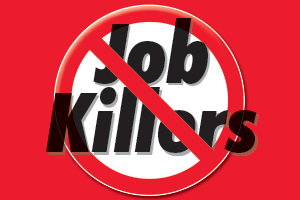 A California Chamber of Commerce job killer bill that will increase unemployment insurance (UI) taxes to subsidize striking workers passed the Assembly Appropriations Committee yesterday and is expected to be heard on the Assembly floor sometime next week.
A California Chamber of Commerce job killer bill that will increase unemployment insurance (UI) taxes to subsidize striking workers passed the Assembly Appropriations Committee yesterday and is expected to be heard on the Assembly floor sometime next week.
The bill, SB 799 (Portantino; D-Burbank), will allow striking workers to claim UI benefits when they choose to strike. Because the UI Fund is paid for entirely by employers, SB 799 will effectively add more debt onto California employers. Moreover, SB 799 will effectively force employers to subsidize strikes at completely unrelated businesses because the UI Fund’s debt adds taxes for all employers, regardless of whether they’ve had a strike.
Increasing the UI taxes employers pay would be especially burdensome now, as California employers are already paying increased UI taxes pursuant to federal law resulting from the COVID-19 pandemic, and are likely to face ongoing tax increases until approximately 2032.
Bill Would Worsen UI Fund Crisis
In an opposition letter signed by more than 120 organizations, the CalChamber explained that SB 799 would give striking workers the ability to claim unemployment after two weeks of striking—and thereby add the cost of those benefits to California’s outstanding $18 billion in federal loans.
Though the amount that such strikes would add to the UI Fund debt is hard to calculate specifically—due to uncertainty as to how many strikes occur, how long they last, and how many workers take part—it is undeniable that SB 799 would add more debt to the state’s federal loans.
“We estimate that, if SB 799 had been in effect during the previous 12 months, it would have added approximately $215 million to the UI Fund’s debt. Additionally, we would expect it to add approximately $30 million per week if it were in effect now,” the CalChamber said.
In addition to adding to employers’ tax burden, SB 799 will also add to the state’s general fund obligation regarding the UI Fund. For example, in 2023–2024, the interest payment is expected to cost the state approximately $300 million—and similar payments will continue until the UI Fund returns to solvency.
Forces Uninvolved Employers to Pay
The CalChamber pointed out that SB 799 creates a fundamental unfairness by forcing employers with absolutely no involvement in any strikes to pay for labor disputes with which they are not involved.
UI Fund loans from the federal government are paid off via tax increases on all employers across the state—not just employers who have striking workers.
“Taking money from every other employer in the state (small employers included) and forcing those uninvolved parties to pay the costs of one side of a labor dispute is profoundly unfair,” the CalChamber said.
Unemployed vs. Being on Strike
SB 799 alters the nature of UI by providing unemployment to workers who still have a job and have chosen to temporarily refuse to work as a negotiating tactic. Striking is a federally protected right and has historically been a key strategy in labor disputes. But being on strike is not the same as being terminated, the CalChamber stressed.
Striking workers generally have the right to return to their position at the conclusion of the labor dispute, under both federal law and union contracts, the CalChamber said. In contrast, an employee who has been terminated has no similar job waiting for them and is truly facing an uncertain future—which UI helps by providing some support while they look for new work.
“Striking workers have a job—they are just choosing not to work in order to create economic pressure and negotiate. That is not the same as having no idea where your next paycheck comes from,” the CalChamber pointed out.
Staff Contact: Robert Moutrie


